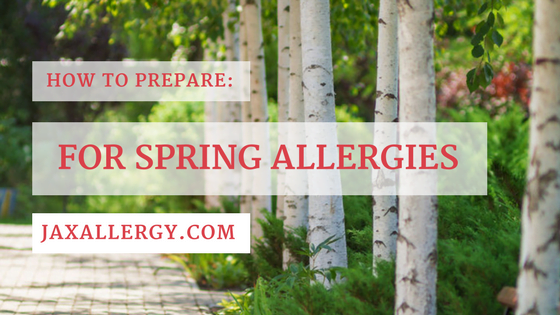Being Proactive with Allergies:

How to Prepare for Seasonal Spring Allergies
When spring is in the air, we know allergy season is fast approaching. The warmer weather causes plants to bloom and release pollen into the air. If you suffer from seasonal spring allergies, you likely experience symptoms starting in January and lasting through May. Occasionally, tree pollen shows up earlier in pollen counts so it’s important to prepare for spring allergies before the peak season begins.
Don’t wait until allergy season to get prepared. Whether you make an appointment with an allergist now or start taking allergy medications, plan in advance for spring allergies. If you haven’t been allergy tested, now is a great time to do it. Use the following seven tips to be proactive with allergies this spring.
1. Schedule an Appointment with Your Allergist
Don’t wait for allergy symptoms to start before making an appointment to see your allergist. Be sure to schedule your appointment before tree pollen appears in February, sometimes as early as January in Florida. An allergist can run tests to confirm the causes of your allergies and prepare a treatment plan to keep you feeling your best.
2. Start Allergy Treatment Before Symptoms Are Present
Your allergist may recommend antihistamines or other allergy medications to help you combat the spring allergy season. You should start taking medications around two weeks before you typically experience allergy symptoms.
Antihistamines help block or reduce histamines which cause allergy symptoms. Getting the medication in your system early can help ease or reduce a stuffy nose or itchy, watery eyes (see also our eye allergies treatment page). If you need treatment beyond mediations, allergy shots (immunotherapy) can desensitize you to bothersome allergens over time. These treatments typically take a few months before patients feel relief but can offer lifelong relief of allergy symptoms, resulting in a significant decrease in medication use.
3. Track Pollen Levels
Grass and tree pollen are the biggest allergen offenders during the spring. Allergy apps for your smartphone or tablet can help you keep an eye on daily local pollen counts. In addition, keep track of the days when your allergies are worse to help you plan. Mid-morning and early evening are peak pollen hours. It’s best to stay indoors on days when the pollen counts are high.
4. Do Your Spring Cleaning Early
When longer days bring more daylight streaming through your windows, it’s easier to notice the dust and cobwebs that took over during the winter. Spring is a great time for allergy sufferers to deep clean their entire home to remove unwanted dust and pollen.
Spring Cleaning Checklist
- Clean/dust all light fixtures
- Wash curtains
- Clean bedding
- Dust bookshelves/surfaces
- Dust electronics/appliances
- Clean rugs
- Vacuum upholstered furniture
- Sweep and mop floors
- Organize closets
5. Keep Windows Closed
As tempting as it is to fling open the windows and let the fresh air inside, keep them shut during peak pollen season. A fresh, spring breeze will likely bring pollen particles with it. Keep windows and doors shut in your home and your car to avoid pollen exposure until levels decline.
6. Refresh Your Air Filters
It’s recommended to change the air filter on your HVAC every three months to keep the air inside your home clean and fresh. It may also be time to change out the HEPA filter on your vacuum.
Don’t forget to consider other products around the house to help decrease exposure to allergens such as quality mattress covers and allergen-friendly pillowcases to reduce dust mites and prevent allergies.
7. Beware of Mold
Spring’s humidity also brings high quantities of mold spores in bathrooms, kitchens, basements, or any areas with high moisture. Check under sinks, around bathrooms, in closets on outside walls, and under the doormat. Clean and remove any mold and keep an eye on humidity levels in your home (below 50% recommended) to keep mold from returning. Repair any leaks and make sure areas have proper ventilation.
Are you ready for spring allergies in Jacksonville? Schedule an appointment today with the Allergy & Asthma Specialist of North Florida to make sure you’re prepared. Call us today at 904-730-4870 or request an appointment online.
